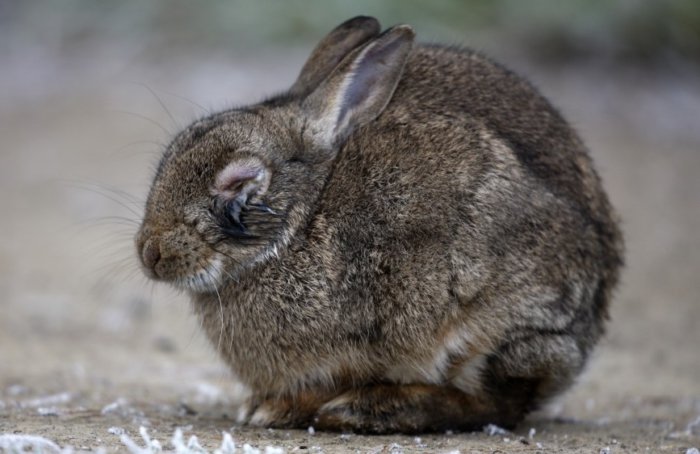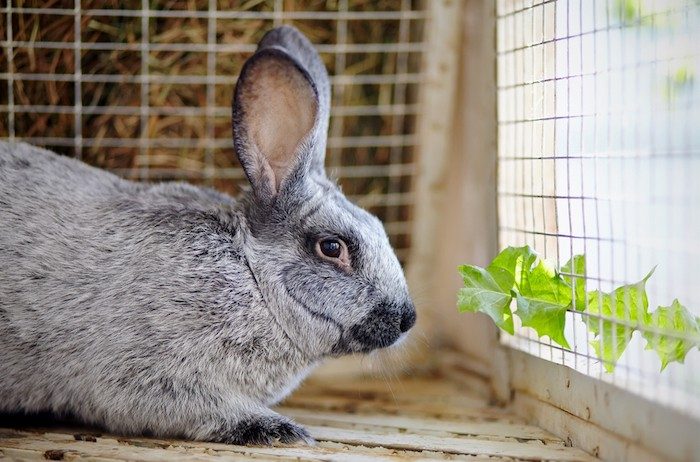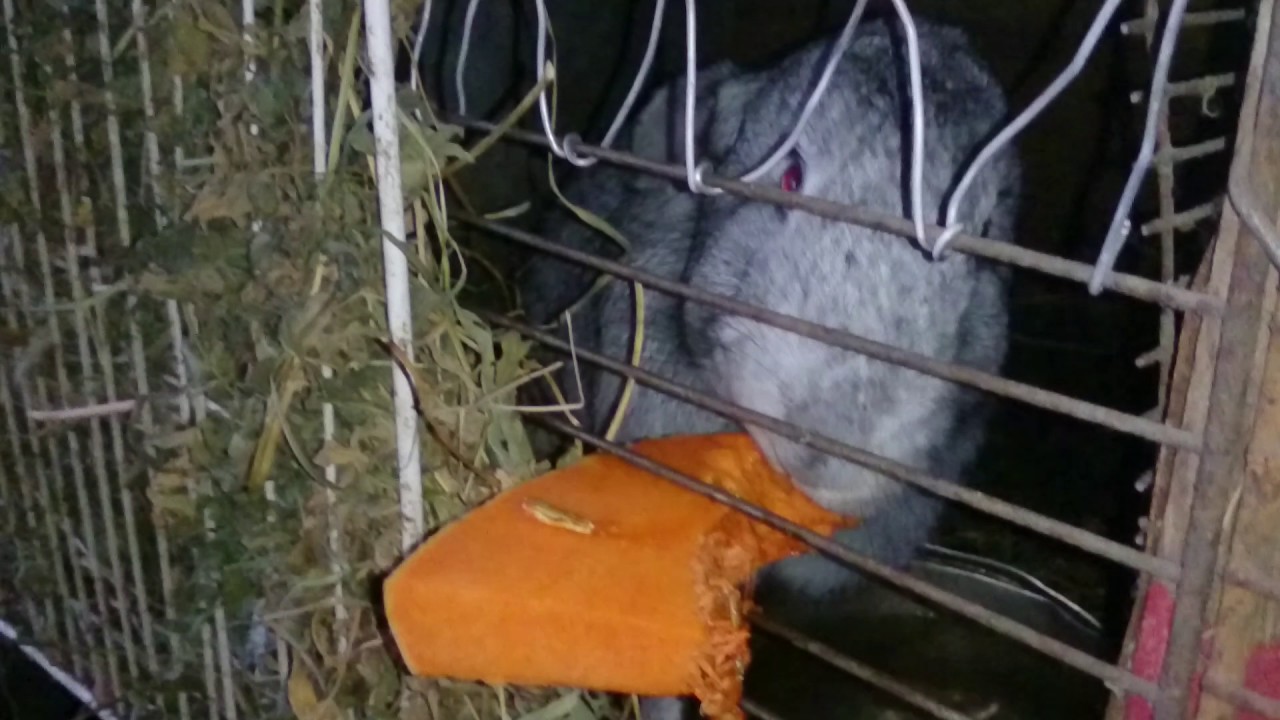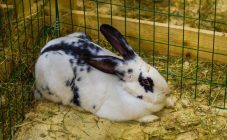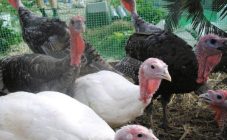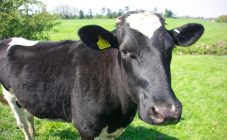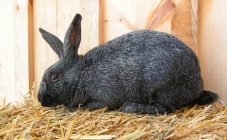Content:
- Why do rabbits swell and die?
- Bloating in rabbits: cause and treatment
- Rabbits have bellies and death - what to do
- The rabbit has a swollen belly - what to do and how to treat
- Treatment with antibiotics, medications and analgesics
- Features of feeding with gastrointestinal stasis
- Bloating in rabbits how to treat: measures to prevent tympania
The process of assimilation of food in rabbits is very unstable. It is for this reason that the animal may often encounter disorders in the functioning of the intestines and the digestive system as a whole. A common stomach ailment is tympania (popularly known as abdominal distention), which is experienced by both experienced breeders and beginners.
Why do rabbits swell and die?
Digestion is a continuous process in virtually all grass-fed animals, and rabbits are no exception. This means that the intestines and stomach of the furry eared ears digest food around the clock. Digestion proceeds normally until the moment when gastrointestinal stasis occurs, a disease that entails a complete blockage of the intestines and stagnation of food. The pet's belly begins to blow, which entails unpleasant consequences.
Many livestock breeders ask themselves: why do rabbits have swollen bellies, as a result of which they die? When the intestines are blocked, the belly can swell (the amount of gas increases), the appetite of pets is disturbed, which, in turn, often leads to death. Also, sometimes the rabbit grinds its teeth, and liquid begins to gurgle in its abdominal cavity. Novice rabbit breeders, in order to avoid unnecessary costs and hassle, should first familiarize themselves with the reasons for this phenomenon. So, the belly of rabbits can swell and swell due to the following factors:
- stressful situations occurring due to a sharp change in the diet, the movement of rabbits to another place, the presence of a number of predatory animals or changes in weather conditions;
- getting into the stomach of wool or low-quality products that cause the fermentation process;
- multiplication of infectious bacteria that enter the intestines along with poor-quality food;
- dehydration of the body - every day, adults need to be watered (at least 0.5 liters of water for one rabbit), providing them with constant access to fluid.
A disease such as tympania develops in the body of rabbits due to disturbances in the microflora of the stomach. Among the common causes of tympania, there is a sedentary lifestyle, treatment of rabbits with antibiotics, which negatively affect the intestinal microflora, as well as diseases of the oral cavity and teeth.
Bloating in rabbits: cause and treatment
Recognition of gastrointestinal stasis is possible already at the initial stage of its development.Rabbit breeders who are just starting to breed these cute animals should definitely familiarize themselves with the obvious and hidden signs of GI symptoms:
- Lethargy and depression, gnashing of teeth, and refusal to eat. Loss of appetite is very easy to notice, since healthy individuals always eat with pleasure and in large quantities.
- If rumbling and flatulence are found, the rabbit's abdomen should be palpated. In the presence of transfusion, gurgling, rumbling, as well as a tangible compaction at the walls of the abdominal cavity, it can be concluded that excess fluid, gases and food accumulate in the intestines.
- Irregular bowel movements. If the litter is absent for more than 12 hours, the color changes sharply or the size of the characteristic balls decreases.
Experienced breeders recommend using a stethoscope, an inexpensive but very useful device, to thoroughly examine rabbits. With the help of such a device, the intestines of a rabbit are easily listened to, which will help to determine the symptoms of the disease as accurately as possible.
If blood clots, mucus or diarrhea lasting for several hours are seen in the discharge of rabbit droppings, this is an indication of the presence of a dangerous infection or other diseases in the body, due to which the animal may die. In this case, you need to immediately seek help from a veterinary clinic.
Rabbits have bellies and death - what to do
Inexperienced rabbit breeders ask themselves: what to do if the rabbit has a swollen belly? If the first signs of an intestinal disorder are found, veterinarians recommend the following procedure:
- An animal that is sick must be immediately transferred to a separate room so as not to infect the rest of the rabbits;
- In order to carefully examine the pet, you must put it on your back on your knees, taking it under the front paws. If the rabbit knocks with its paws, resists and gets nervous, it needs to be reassured, and after the animal gets used to its hands, it is necessary to feel the stomach and massage it.
After a thorough examination of the pet and detection of a swelling of the abdominal cavity, you need to contact a specialist, but if for some reason this is not possible, immediately start treatment. Rabbit breeders treat animals with both medicinal and folk methods, sometimes combining them.
The rabbit has a swollen belly - what to do and how to treat
A safe and simple method of treatment is the use of decoctions and preventive massage. It needs to be done with smooth finger movements. Strong pressure is strictly prohibited, because rabbits have very delicate internal organs. The massage can be either circular or along the line from the tail to the head. The main purpose of the massage is to help the rabbit to cope with the mass stuck in the stomach and push it through.
The method of treating pets with decoctions is also effective, but it is worth noting that it is more preventive. Decoctions are not able to cope with acute manifestations of FSW, so you should not even waste your time on this, because the life of an animal can end at any time. In order to prepare the broth, experts advise using dill, chamomile, wormwood and dandelion. For preventive purposes, these components can be mixed into food dry.
Another remedy that can prevent the fermentation process is alcohol, which can be found in almost every home. For the treatment of adults, no more than 2 tablespoons of warm homemade moonshine or vodka is needed, the strength of which does not exceed 30 degrees.
Treatment with antibiotics, medications and analgesics
Novice rabbit breeders should always listen to recommendations regarding the use of a particular medication. They can very often be useless, and sometimes they can even cause significant harm to the animal. But, despite this, the first-aid kit must contain the following drugs:
- Tympanol, which is a specialized veterinary medicine used for abdominal distention in ruminant animals. The dosage should be determined based on the weight of each pet, but for each kilogram of weight, 0.5 mg of the substance is needed, diluted in a tablespoon of warm water. The resulting product will act for half an hour. Before using Tympanol, the instructions for use for rabbits should be studied.
- Activated carbon, which is a completely safe and useful medicine. A sick pet should be treated with 2-3 tablets of coal, which must first be crushed and dissolved in 200 ml of warm water.
Features of feeding with gastrointestinal stasis
Recovering and sick animals should be provided with a special diet for 5 days (this is how long the gastrointestinal stasis lasts). From the list of foods that are included in the diet of rabbits, you need to completely exclude fresh vegetables and fruits, as well as beet tops, cabbage and legumes.
The best food for rabbits during periods of illness is oats or hay. You can periodically add zucchini and pumpkin to the food, as well as dry and chopped sprouts of wormwood, parsley, dill, chamomile, sage and dandelion. All of these herbs can effectively fight bloating, so you don't need to deprive your furry pets of them.
Bloating in rabbits how to treat: measures to prevent tympania
It is almost impossible to permanently save rabbits from gastrointestinal disorders, but with the help of useful recommendations it is quite possible to reduce the frequency of their manifestation. In no case should pets be over-fed with juicy grass, fresh vegetables and fruits, otherwise they will develop intestinal disorders. Before feeding rabbits, all food should be thoroughly washed and inspected for mold and rot. Sugar and sugary foods should be excluded from the diet of animals, and access to clean drinking water should be ensured around the clock.
It is worth noting that today the Internet is literally replete with all kinds of advice and recommendations regarding what diseases of rabbits exist, symptoms and methods of treating bloating. But if the breeder does not yet have experience and he cannot even establish the correct diagnosis, then it is best to seek help from a veterinarian.
